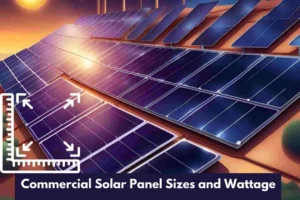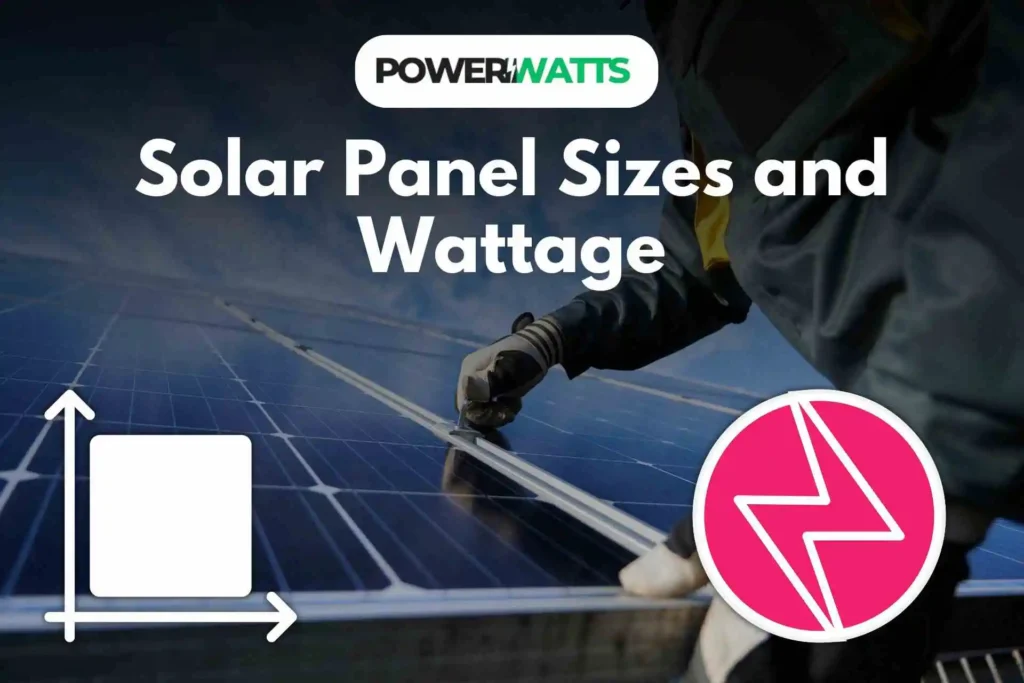Tired of excessive energy expenses stifling your profits? Do not wait, now is the time to let people know about a way to help your business save a lot of money and look better at the same time. According to my experience, Getting solar panels for your business is the best way to save money and get rid of your energy bills.
It can be like looking for a needle in a haystack to find the right size and size of a solar panel for your home. Do not be scared. This guide will help you understand the commercial solar panel sizes and wattage of your system. In order to help you make a buy that meets the needs of your business, we will explain the changes between panel sizes and power output. Listen up, because we are about to talk about how to turn your business into a green place.
Understanding Commercial Solar Panel Sizes and Wattage
Commercial solar panels are usually bigger than household panels because they are made to meet the different energy needs of businesses. According to our research, some of these panels are up to 2.3 meters (m) tall and 1.2 meters (m) wide. Most of them are between 2.1 meters (m) tall and 1.1 m wide. This bigger size makes them better at making electricity, so they can be used on bigger roofs or installed on the ground.
Most business solar panels have 72 solar cells, while most home panels only have 60. For industrial panels, this extra cell count greatly increases the power output, which is usually between 315 and 550 W or more. Because these panels are bigger and have more power then they are perfect for companies that want to make the most of their energy production and efficiency. So, companies can make choices that meet their energy needs and help the environment by knowing the details about the size and power of industrial solar panels. And if you need customized help then Get a Quote.

Factors Influencing Commercial Solar Panel Size Selection
When choosing commercial solar panel sizes and wattages, numerous considerations come into play:
- Available roof or ground space: Maximum panel size and quantity depend on building or property measurements.
- Power needs: Your business’s energy requirements determine its electricity wattage.
- Weather locally: Sunlight, temperature, and precipitation affect solar panel efficiency and output.
- Budget: Solar installation costs depend on panel size and quantity.
Calculating Your Commercial Solar Panel Needs
Steps to identify the best size and wattage of commercial solar panels:
Check your energy use:
Check your historical power invoices to find your typical monthly and daily kWh use.
Determine power needs:
Increase your daily energy use by 120% to account for growth and inefficiencies.
Select panel wattage:
Select a panel wattage that matches or exceeds your power needs. Higher-wattage panels may be more efficient but more costly.
Determine panel count:
To calculate the number of panels needed, divide your power needs by the panel wattage.
Consider panel sizes:
Consider the panel measurements to ensure they suit your roof or ground space.
Advantages of Larger Commercial Solar Panels
Here are six of the most important benefits of commercial solar panels such as
1. More energy being produced
Larger solar panels naturally collect more sunlight, which means they produce more energy. This means being less dependent on the power grid, being more self-sufficient, and possibly not having to pay for energy at all or paying much less.
2. Installation costs per watt that are lower
Even though bigger panels may cost more upfront, they tend to produce less expensive energy per watt. I am sure this will save a lot of money over the life of the panel.
3. Fewer panels
To make the same amount of power as smaller panels, larger panels need fewer units. This can be very important for businesses that don’t have a lot of roof room because it lets them produce the most energy without giving up valuable space.
4. Better efficiency
The technology behind solar panels is always changing, and the newest improvements are often built into bigger panels. This could lead to better efficiency rates which means that the same amount of sunshine can produce more energy.
5. Better Appearance
Fewer, bigger pieces can often make a project look better and cleaner. This is particularly crucial for companies operating in areas where aesthetic standards are strictly enforced or for individuals wishing to improve the aesthetics of their properties.
6. Potential for Energy Storage
Larger panels can make it more practical to buy energy storage systems because they produce more energy. This lets companies store extra solar power to use during times of high demand or when the power goes out giving them energy freedom and saving them money.
Even though bigger business solar panels have many benefits, it’s important to think about things like the structure of your roof, the weather where you live, and your energy needs before making a choice. Businesses can get the most out of bigger industrial solar panels and enjoy clean, low-cost energy by carefully considering these benefits and talking to skilled experts.
Considerations for Commercial Solar Panel Installation
Commercial solar panel installation requires consideration of these factors:
- Type and condition of roof: Avoid leaks by making sure your roof can hold your solar panels and is in excellent shape.
- shade: Reduce shade from trees, buildings, and other barriers to enhance panel efficiency.
- Orient and tilt your panels to maximize sunlight and energy production.
- Local rules: Check with your local authorities to ensure your solar system fulfills construction and zoning rules.
Conclusion
Now, I am sure you understand which commercial solar panel size and wattage is best for your commercial solar panel installation. I am sure, that by considering installation space, energy demands, and budget, you can choose the best panels to satisfy your energy needs and reduce your carbon impact.
Get a Quote from our reputable solar supplier now. Start using solar energy to grow your company and get its many advantages
FAQs
What battery size do I need for commercial solar installation?
Calculate your business’s daily kWh energy use and backup power needs to estimate battery capacity. Depending on your demands and solar generating dependability, aim for battery capacity to support one to three days of energy consumption.
What types of batteries are best for commercial solar systems?
Commercial solar system batteries typically include:
- High-energy density, efficient, and long-lasting lithium-ion batteries.
- Lead-acid batteries are cheaper but less efficient and last less than lithium-ion.
- Flow batteries store energy for longer in bigger systems.
How does battery size affect commercial solar system wattage?
While battery capacity does not directly affect solar panel power, it does affect energy storage. Bigger batteries make it easier for businesses to utilize solar power more effectively, especially during times of peak demand and higher energy costs.
How does commercial solar panel wattage vary?
Solar panels for business use generally have 315 to 550 watts or more. For instance, 72-cell panels typically yield 400 to 500 watts, although some sophisticated ones may exceed 700.
What is the biggest commercial solar panel size?
Big commercial solar panels may generate 700 watts and have 144 cells. Solar panels could boost the production of energy for high-energy businesses.


